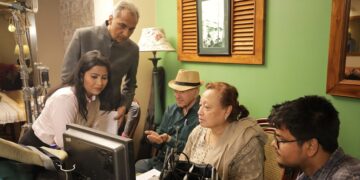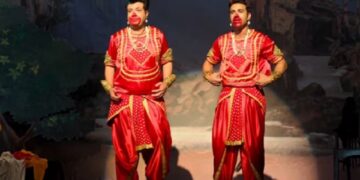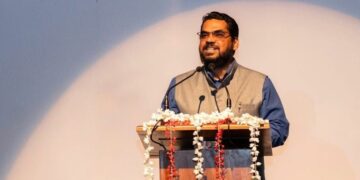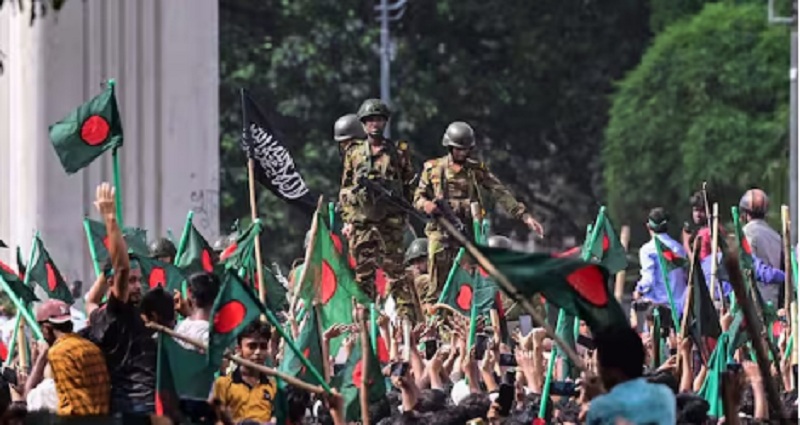On August 7 last year, the Daily Star of Bangladesh carried a “Reuters Exclusive” that on the night before former Prime Minister Sheikh Hasina left for Delhi on August 5, Chief of the Bangladesh army General Waker-uz-Zaman in a meeting with his generals decided that troops would not open fire on the protesters who had planned to storm her residence the next morning. The army chief conveyed to the Prime Minister that his soldiers would be unable to protect her. Realizing that she had lost the support of the army, Sheikh Hasina then decided to quit and leave her country.
The report of Daily Star was even accompanied with a photograph of agitators on the streets on August 5 morning defying a curfew order, shaking hands with soldiers sitting atop a tank with rifles, smiling.
While this exclusive was broken two days after the departure of Sheikh Hasina, even on August 4 evening, there was an early indication that the army could withdraw its support from the Prime Minister of the country. Even there were reports in the media regarding a call from a retired army officer of Bangladesh to the troops not to open fire on agitators the next morning. On the morning of August 5, among the protesters who defied the curfew orders to storm the official residence of the Prime Minister were retired senior officers like Brigadier General Mohammed Shahedul Anam Khan. “We were not stopped by the army,” Khan was later quoted as saying. “The army has done what he (General Waker-uz-Zaman) had promised the army could do.”
It is clear from these that the uprising against Sheikh Hasina led by the Students Against Discrimination (SAD) on August 5 would not have succeeded without the connivance of the Bangladesh army.
It was surprising indeed that on March 23 this year, the newly formed National Citizens Party (NCP), which is essentially the political wing of the SAD, accused the military of hatching a plot to rehabilitate Sheikh Hasina’s party Awami League; and even staged protest rallies in the Dhaka University campus, vowing to thwart at any cost a ‘military backed plot’ to rehabilitate the party. SAD leader Asif Mahmud said in a video post that the military was reluctant to accept Yunus as the head of the Interim Government.
In response, the army stepped up patrolling in the national capital Dhaka. The next day, the army duly rejected the allegation. The military headquarters said the charge levelled by the NCP was “nothing but a political stunt,” calling it “hilarious and an immature array of stories.”
Observers say that the mistrust between the forces — the SAD in its new avatar, the NCP, and the army — that had connived to pull down the Sheikh Hasina government is indicative that the so-called “revolution” staged by SAD protesters has run out of wind. Now, the student protesters of SAD reorganized into NCP have realized that they have no support base among the common Bangladeshi people. If they have to face the election within a short time frame they stand no chance.
NCP leaders now want to postpone the polls under various pretexts. The Interim Government, headed by Mohammed Yunus, too, wants to postpone the elections as there is little chance of Yunus returning to power in a post-poll scenario. Yunus has not promised anything concrete about the possible time the elections will be held, saying the polls will be held sometime between December 2025 and June 2026.
Ironically, the Bangladesh Nationalist Party (BNP), the third pillar of the triumvirate that had ganged together to pull down the Sheikh Hasina government, wants the polls to be held early. Its leaders consider the BNP to be the only political alternative to the Awami League and are confident that if elections are held early, there will be no stopping the BNP from capturing power, as the Awami League is now a disarrayed lot. On the other hand, if the elections are postponed indefinitely the political initiative will pass into the hands of the NCP and finally hardcore Islamic fundamentalist forces, backed by Jamaat – e – Islami, will hold sway in Bangladesh.
Interestingly, the Awami League, too, wants the elections to be held within this year. The BNP has warned of instability and “strong resentment within the people” if elections are not held by December. On the other hand, indicating that the elections could be postponed till June 2026, Mohammed Yunus has said this would allow time for the “reforms” to be completed so “the most free, fair and credible elections in Bangladesh” could be conducted.
NCP leader Nahid Islam has said it will be difficult to hold the elections this year as policing and law and order have not yet been fully restored. Convener Nasiruddi Patwari of Jatiya Nagarik Committee, the predecessor of Jatiya Nagarik Party, the NCP, said in December last that there would be no election before the trial of Awami League leaders. “If there is an election before the trial of 2024, the 2,000 martyrs and millions will not get any justice,” he said. That would put back the elections indefinitely.
The army, on the other hand, wants an early election, with the Army Chief saying the elections should be held by December. “We are heading towards a free, fair and participatory poll,” he said in February. Whenever I spoke to Dr Yunus, he completely agreed that the election should be held in December.”
The other surprising difference that has surfaced within the gang that upstaged the Sheikh Hasina government is whether the Awami League should be allowed to return to the electoral politics or not. BNP said on March 21 it had no objection to the return of the Awami League to politics under a “clean leadership.” BNP spokesman Ruhul Kabir Rizvi said: “We have nothing to say if the people accept Awami League after a quick trial of those involved in crimes committed by the regime.”
On the other hand, NCP does not want the Awami League to participate in the polls. “No, we don’t want the Awami League to participate in the elections,” NCP convener Nahid Islam told the Diplomat in an interview on March 19.
ALSO READ: Bangladesh Police seeks Interpol red notices for ex-PM Sheikh Hasina, 11 others
Attaching significance to the stance of the BNP, political observers argue that the BNP may not be averse to forming the next government in coalition with a “reformed Awami League” to defeat the NCP and prevent fundamentalist forces backed by Pakistan from gaining control of Bangladesh.
The differences within the Bangladeshi gang that had staged the ouster of the Sheikh Hasina government are, thus, deep.















